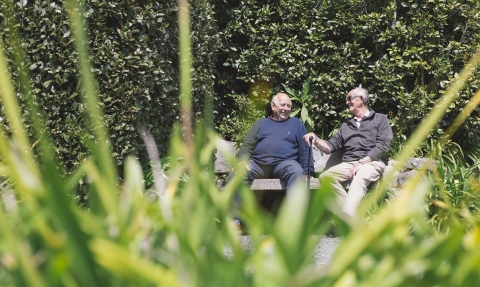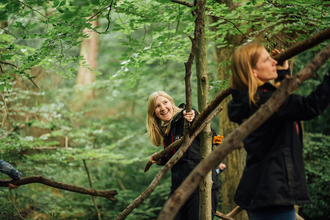
Useful information for local groups
The Wildlife Trust’s Nextdoor Nature Hub is a great place to start for advice and guidance on all aspects of running a community group – whether it’s how to set up a group, tips on finding funding, how to run an event or advice on engaging with local stakeholders.
Here you’ll also find inspiring stories from around the UK of community-led action for nature.
We’ve included below some guidance and templates for groups in Cornwall.
Getting started
If you’re a new group, things you might need to consider include what type of group you want to be, how to write your constitution, what insurance you need and whether you need a bank account.
A good first step is The Wildlife Trust's Community Hub advice on Setting up a Basic Community Group.
The National Council for Voluntary Organisations also have lots of useful information for community groups.
Here are some other links and templates you may find useful:
Planning and drafting your constitution
Health and Safety
Whatever activities your group is doing, you’ll need to make sure you’re keeping safe yourself, and any volunteers or members of the public you’re working with.
You’ll need to carry out a risk assessment and make sure everything is as safe as it can be. We’ve included below some useful templates to help you carry out your risk assessments.
Safeguarding
If you’re working with under 18s and / or vulnerable adults, you’ll need to consider your safeguarding responsibilities.
The Community Hub provides a useful overview of what you need to consider.
We’ve also included some helpful links below with further information and resources
Sources of support:
-
GPs
-
Safeguarding Children – NSPCC
-
Safeguarding Adults at Risk – Ann Craft Trust
Fundraising
The Wildlife Trusts' Community Hub has a guide on How to Find Funding with some great tips on what you need to consider when you’re thinking about applying for funding, and where you can find funding opportunities.
If you are an Associated Group, visit our dedicated Associated Groups area to see a spreadsheet listing funding opportunities we think may be of interest to you. We’ll keep this regularly updated.
Running events
Events are a great way to help people learn about the wildlife and nature in their local area and what your group does to support it. They help people see the benefits of nature – for themselves and the environment, and can also help inspire people to take their own actions for nature including joining your group! The more fun, hands-on and interactive the activity, the more chance you’ll have of a lasting positive impact.
If you’d like to run an event, here are some things to consider:
-
What’s your topic or theme? Our Actions for Wildlife pages might give you some inspiration
-
Who are you target audience?
-
Can you collaborate with another organisation or local expert?
-
Where will you hold your event?
-
Do you need any specialist equipment?
-
How inclusive is your event? Consider how accessible your activity, location and event information is. Sensory Trust has lots of great guidance on this. You can also use this Event Accessibility Checklist
-
Do you need any permissions?
-
How will you promote your event?
-
Do participants need to book – how will they do that?
-
Health and safety considerations and risk assessments (see above)
-
Safeguarding considerations (see above)
-
Will you provide refreshments?
-
If you’d like to collect feedback, how will you do this?
-
Taking photos and videos – don’t forget to get consent!
-
Follow up – thanking attendees, sharing photos on social media
And most of all, have fun!
Recording your wildlife data - ERCCIS & ORKS
The Environmental Records Centre for Cornwall and the Isles of Scilly (ERCCIS) is the central resource that collects, manages and disseminates information about the biological and geological state of Cornwall and the Isles of Scilly
It is also the evidence and digital mapping department for Cornwall Wildlife Trust providing support in data collection, management and mapping to aid project delivery across the Trust.
ERCCIS makes biological and habitat information easily accessible for decision-making, conservation management, education, research and public benefit. Much of the data managed is provided by expert volunteers.
You can get involved by submitting your wildlife sightings to ORKS (Online Recording Kernow and Scilly). Groups can have their own ORKs page so you can store, share and review data specific to your local area as well as exploring wildlife sightings across Cornwall.
ERCCIS collaborates with local and national wildlife recorders and conservation groups to help protect the environment in Cornwall. To find out more about how ERCCIS might be able to work with your group, email erccis@cornwallwildlifetrust.org.uk.
Training for Associated Groups
We run a range of training for Associated Groups throughout the year, with topics based on what groups have told us would be most helpful to them. This may include, for example, intro to health and safety, risk assessments, first aid, social media, fundraising, community organising, introduction to ecology, running events, and safeguarding.
Training currently available is listed in the dedicated Associated Groups area. We will also invite all Associated Groups to any training opportunities we arrange so please keep an eye out for our emails. If you would like to find out more about a training course, or you have a topic you would like us to cover, please email associatedgroups@cornwallwildlifetrust.com



